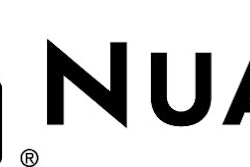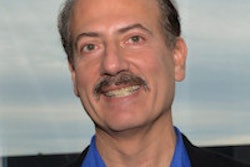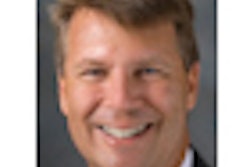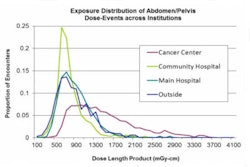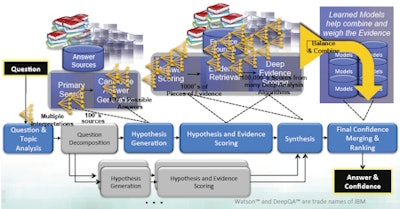
Is it easy to harness the power of a supercomputer to make it useful, practical, and affordable for healthcare applications? Not really, attendees surmised after a presentation at the Healthcare Information and Management Systems Society (HIMSS) annual meeting last week in Las Vegas.
Ever since Watson, IBM's massive artificial intelligence system equipped with natural language processing, became a contestant on the television game show "Jeopardy," healthcare professionals have been interested in its use. This was the talk of the 2011 HIMSS annual meeting, which took place one week after IBM and Nuance Communications announced that they'd entered into a five-year long joint development agreement.
Dr. Nick van Terheyden, chief medical information officer of clinical language understanding at Nuance Communications, discussed the objectives and challenges of the project to date.
"Medicine used to be simple, ineffective, and relatively safe; now it is complex, effective, and potentially dangerous," van Terheyden began, quoting a remark made several years ago by Sir Cyril Chantler, MD, when he was chairman of the King's Fund, a charity intended to investigate how the health system in England can be improved.
"Medical information is doubling every two to three years," he said. "It's been suggested that today's experienced physician needs to retain about 2 million pieces of information, and keep updated by reading at least 2,500 articles relevant to his or her practice that have been published in peer review journals. This is obviously impossible for a physician who needs to practice medicine."
The artificial intelligence of Watson is created by a massive parallel computing system run by more than 90 servers supporting terabytes of clustered storage. It has the ability to analyze the meaning and content of human language, and it rapidly processes information to find precise knowledge and facts contained within huge volumes of information. Its analytics technology has the potential to mine medical literature, data from numerous sources, and specialized patient registries, for example, and apply information contained in a patient's electronic medical record to create a framework of knowledge that could assist medical professionals in providing the best diagnosis and personalized treatment.
Watson can keep a physician updated with just-in-time, state-of-the-art medical knowledge, guidelines, and treatment recommendations. It could keep a healthcare provider from information overload by providing the most likely information needed at an extraordinary speed. Or, as Nuance's chairman and chief executive officer Paul Ricci said at the time of the research agreement announcement, "it will transform the capture, flow, and use of clinical data, empowering healthcare organizations to drive smarter, more efficient clinical and business decisions."
Over the past 12 months, both companies have hired product development teams that include clinical informatics physicians and related healthcare professionals, research scientists, workflow analysts, natural language processing specialists, and interface designers, because any product has to engage the user.
The framework of information needs to be different from that used to play Jeopardy. Watson needs to identify problems, evaluate hypotheses that may solve the problems, and quantify confidence in the answers. However, data sources need to be weighted based on their importance. The most recent best practice guidelines of a medical society need to supersede older guidelines that might have hundreds of sources (peer review articles) referencing them.
The goal may be to search for the most obscure exceptions to common medical knowledge, and then to rank them against known symptoms with respect to probability. How should such information be best presented without intruding upon interactions with patients and a physician's or other medical provider's clinical workflow routine? How should providers of data be paid when Watson uses the data?
These issues -- and the most critical one, developing a filtering process that brings the most contextually relevant data to the point of care while integrating this process into the clinical workflow -- are the challenges being addressed by the joint research and project development team.
Van Terheyden envisions that when a commercial product is developed, it will be sold as a cloud-based Deep QA (quality assurance) solution due to the need for a centralized computer cluster. He expects it to be a state-of-the-art system oriented to evidence-based decision-making in healthcare. The system would report the suggested decisions and the decision process, and report the aggregated data from clinical processes. It would offer one or more services to assist various medical professionals involved in the patient life cycle -- from wellness maintenance to prevent illness, to diagnosis and treatment of patients, to personalized management of chronic diseases.
He expects a commercial product to have the ability to interpret medical records, answer specific questions, and offer differential diagnoses and probability analyses with links to literature sources. These will be created by analyzing the specifics of a patient's case, including demographics, history, and medical conditions, and comparing this against vast volumes of clinical data and medical data. This could include comparison with databases of patients.
Watson could act upon what is known, such as medication dosage guidelines and clinical research findings, providing risk assessment for adverse drug reactions and treatment options for each possible diagnosis contextualized to the patient. Throughout the process, working with patients and physicians, the system could continue to refine itself based on dynamic interaction and learning.
At this point, some preliminary prototype demos are being tested, but van Terheyden said it was too soon to discuss them.
When asked by an attendee if Watson could change the way that students at medical schools are taught, he acknowledged that it had the potential to facilitate changes. "When I went to medical school, instructors filled my head with knowledge that I was expected to remember much like an encyclopedia. Today, the question is how to best use the data that is electronically accessible to us."
But one thing that Watson will not do is replace a clinician. "The human brain is the best information processor on the planet," he concluded.




